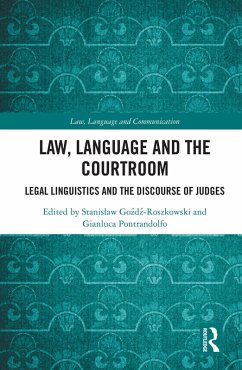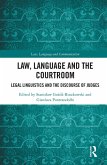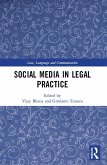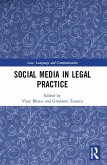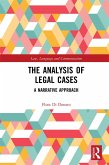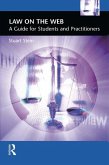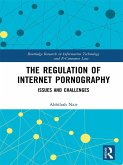Law, Language and the Courtroom (eBook, PDF)
Legal Linguistics and the Discourse of Judges
Redaktion: Gozdz Roszkowski, Stanislaw; Pontrandolfo, Gianluca
44,95 €
44,95 €
inkl. MwSt.
Sofort per Download lieferbar

22 °P sammeln
44,95 €
Als Download kaufen

44,95 €
inkl. MwSt.
Sofort per Download lieferbar

22 °P sammeln
Jetzt verschenken
Alle Infos zum eBook verschenken
44,95 €
inkl. MwSt.
Sofort per Download lieferbar
Alle Infos zum eBook verschenken

22 °P sammeln
Law, Language and the Courtroom (eBook, PDF)
Legal Linguistics and the Discourse of Judges
Redaktion: Gozdz Roszkowski, Stanislaw; Pontrandolfo, Gianluca
- Format: PDF
- Merkliste
- Auf die Merkliste
- Bewerten Bewerten
- Teilen
- Produkt teilen
- Produkterinnerung
- Produkterinnerung

Bitte loggen Sie sich zunächst in Ihr Kundenkonto ein oder registrieren Sie sich bei
bücher.de, um das eBook-Abo tolino select nutzen zu können.
Hier können Sie sich einloggen
Hier können Sie sich einloggen
Sie sind bereits eingeloggt. Klicken Sie auf 2. tolino select Abo, um fortzufahren.

Bitte loggen Sie sich zunächst in Ihr Kundenkonto ein oder registrieren Sie sich bei bücher.de, um das eBook-Abo tolino select nutzen zu können.
This book explores the language of judges. Using a range of disciplinary and methodological perspectives, it looks in detail at the ways in which judicial discourse is argued, constructed, interpreted and perceived.
- Geräte: PC
- mit Kopierschutz
- eBook Hilfe
Andere Kunden interessierten sich auch für
![Law, Language and the Courtroom (eBook, ePUB) Law, Language and the Courtroom (eBook, ePUB)]() Law, Language and the Courtroom (eBook, ePUB)44,95 €
Law, Language and the Courtroom (eBook, ePUB)44,95 €![Social Media in Legal Practice (eBook, PDF) Social Media in Legal Practice (eBook, PDF)]() Social Media in Legal Practice (eBook, PDF)43,95 €
Social Media in Legal Practice (eBook, PDF)43,95 €![Social Media in Legal Practice (eBook, ePUB) Social Media in Legal Practice (eBook, ePUB)]() Social Media in Legal Practice (eBook, ePUB)43,95 €
Social Media in Legal Practice (eBook, ePUB)43,95 €![The Analysis of Legal Cases (eBook, PDF) The Analysis of Legal Cases (eBook, PDF)]() Flora Di DonatoThe Analysis of Legal Cases (eBook, PDF)44,95 €
Flora Di DonatoThe Analysis of Legal Cases (eBook, PDF)44,95 €![Law on the Web (eBook, PDF) Law on the Web (eBook, PDF)]() Stuart SteinLaw on the Web (eBook, PDF)46,95 €
Stuart SteinLaw on the Web (eBook, PDF)46,95 €![The Regulation of Internet Pornography (eBook, PDF) The Regulation of Internet Pornography (eBook, PDF)]() Abhilash NairThe Regulation of Internet Pornography (eBook, PDF)44,95 €
Abhilash NairThe Regulation of Internet Pornography (eBook, PDF)44,95 €![Health Law and Medical Ethics in Singapore (eBook, PDF) Health Law and Medical Ethics in Singapore (eBook, PDF)]() Gary Chan Kok YewHealth Law and Medical Ethics in Singapore (eBook, PDF)42,95 €
Gary Chan Kok YewHealth Law and Medical Ethics in Singapore (eBook, PDF)42,95 €-
-
-
This book explores the language of judges. Using a range of disciplinary and methodological perspectives, it looks in detail at the ways in which judicial discourse is argued, constructed, interpreted and perceived.
Dieser Download kann aus rechtlichen Gründen nur mit Rechnungsadresse in A, B, BG, CY, CZ, D, DK, EW, E, FIN, F, GR, HR, H, IRL, I, LT, L, LR, M, NL, PL, P, R, S, SLO, SK ausgeliefert werden.
Produktdetails
- Produktdetails
- Verlag: Taylor & Francis eBooks
- Seitenzahl: 268
- Erscheinungstermin: 25. November 2021
- Englisch
- ISBN-13: 9781000483819
- Artikelnr.: 62659673
- Verlag: Taylor & Francis eBooks
- Seitenzahl: 268
- Erscheinungstermin: 25. November 2021
- Englisch
- ISBN-13: 9781000483819
- Artikelnr.: 62659673
- Herstellerkennzeichnung Die Herstellerinformationen sind derzeit nicht verfügbar.
Stanis¿aw Göd¿-Roszkowski is Associate Professor and Head of the Department of Specialised Languages and Intercultural Communication, University of Lodz (Poland), where he has been teaching various seminars in specialised communication and legal discourse analysis. His research focuses on functional and corpus-based approaches to the study of judicial discourse in US and Polish courts. He has published widely in the area of variation in legal language, legal phraseology and communicating evaluative meanings in judicial opinions. He is now involved in researching legal argumentation in the justification of judicial decisions. Gianluca Pontrandolfo holds a PhD in translation and interpreting studies. He is currently Senior Research Fellow at the University of Trieste (Italy) in the Department of Legal, Language, Interpreting and Translation Studies (IUSLIT), where he lectures on specialised translation from Spanish into Italian. His research interests include corpus linguistics, legal phraseology, legal translation training, Languages for Special Purposes, genre analysis and corpus-assisted critical discourse studies. He has published widely in the area of legal and judicial discourse from a contrastive corpus-based perspective.
List of contributors
Foreword
Editors' Introduction
PART I. CONSTRUCTING JUDICIAL DISCOURSE AND JUDICIAL IDENTITIES
1. The judicial English Eurolect: a genre profiling of CJEU judgments
2. Evidentiality in US Supreme Court opinions: focus on passive structures
with say and tell
3. Standardisation in the judicial discourse: the case of the evolution of
the French Arrêts de la Cour de Cassation and the use of forms in European
procedural law
4. The consensus case law of the European Court of Human Rights in light of
the Court's legitimacy over time: a corpus-linguistic perspective
5. Spider Woman beats Hulk: Baroness Hale and the prorogation of Parliament
PART II. JUDICIAL ARGUMENTATION AND EVALUATIVE LANGUAGE
6. Making a corpus-linguistic U-turn in multilingual adjudication
7. Evaluative language and strategic manoeuvring in the justification of
judicial decisions: the case of teleological-evaluative argumentation
8. "Without proof of negligence or a causative connection": on causal
argumentation in the discourse of the Supreme Court of Ireland's judgments
on data protection
9. A corpus-based comparative analysis of the evaluative lexicon found in
judicial decisions on immigration
PART III. JUDICIAL INTERPRETATION
10. Pedagogies of context: language ideology and expression rights at the
European Court of Human Rights
11. Free speech, artistic expression and blasphemy laws within the ECHR
margin of appreciation
12. The US Supreme Court's language of racism
13. Do the words of the American Constitution still matter? The question of
"the meaning of meaning" in current judicial argumentation
14. How interdisciplinarity could improve the scientific value of legal
studies of international judicial decisions
PART IV. CLARITY IN JUDICIAL DISCOURSE
15. Conveying the right message: principles and problems of multilingual
communication at the European Court of Human Rights
16. Concision and Clarity in Italian Court Proceedings
Index
Foreword
Editors' Introduction
PART I. CONSTRUCTING JUDICIAL DISCOURSE AND JUDICIAL IDENTITIES
1. The judicial English Eurolect: a genre profiling of CJEU judgments
2. Evidentiality in US Supreme Court opinions: focus on passive structures
with say and tell
3. Standardisation in the judicial discourse: the case of the evolution of
the French Arrêts de la Cour de Cassation and the use of forms in European
procedural law
4. The consensus case law of the European Court of Human Rights in light of
the Court's legitimacy over time: a corpus-linguistic perspective
5. Spider Woman beats Hulk: Baroness Hale and the prorogation of Parliament
PART II. JUDICIAL ARGUMENTATION AND EVALUATIVE LANGUAGE
6. Making a corpus-linguistic U-turn in multilingual adjudication
7. Evaluative language and strategic manoeuvring in the justification of
judicial decisions: the case of teleological-evaluative argumentation
8. "Without proof of negligence or a causative connection": on causal
argumentation in the discourse of the Supreme Court of Ireland's judgments
on data protection
9. A corpus-based comparative analysis of the evaluative lexicon found in
judicial decisions on immigration
PART III. JUDICIAL INTERPRETATION
10. Pedagogies of context: language ideology and expression rights at the
European Court of Human Rights
11. Free speech, artistic expression and blasphemy laws within the ECHR
margin of appreciation
12. The US Supreme Court's language of racism
13. Do the words of the American Constitution still matter? The question of
"the meaning of meaning" in current judicial argumentation
14. How interdisciplinarity could improve the scientific value of legal
studies of international judicial decisions
PART IV. CLARITY IN JUDICIAL DISCOURSE
15. Conveying the right message: principles and problems of multilingual
communication at the European Court of Human Rights
16. Concision and Clarity in Italian Court Proceedings
Index
List of contributors
Foreword
Editors' Introduction
PART I. CONSTRUCTING JUDICIAL DISCOURSE AND JUDICIAL IDENTITIES
1. The judicial English Eurolect: a genre profiling of CJEU judgments
2. Evidentiality in US Supreme Court opinions: focus on passive structures
with say and tell
3. Standardisation in the judicial discourse: the case of the evolution of
the French Arrêts de la Cour de Cassation and the use of forms in European
procedural law
4. The consensus case law of the European Court of Human Rights in light of
the Court's legitimacy over time: a corpus-linguistic perspective
5. Spider Woman beats Hulk: Baroness Hale and the prorogation of Parliament
PART II. JUDICIAL ARGUMENTATION AND EVALUATIVE LANGUAGE
6. Making a corpus-linguistic U-turn in multilingual adjudication
7. Evaluative language and strategic manoeuvring in the justification of
judicial decisions: the case of teleological-evaluative argumentation
8. "Without proof of negligence or a causative connection": on causal
argumentation in the discourse of the Supreme Court of Ireland's judgments
on data protection
9. A corpus-based comparative analysis of the evaluative lexicon found in
judicial decisions on immigration
PART III. JUDICIAL INTERPRETATION
10. Pedagogies of context: language ideology and expression rights at the
European Court of Human Rights
11. Free speech, artistic expression and blasphemy laws within the ECHR
margin of appreciation
12. The US Supreme Court's language of racism
13. Do the words of the American Constitution still matter? The question of
"the meaning of meaning" in current judicial argumentation
14. How interdisciplinarity could improve the scientific value of legal
studies of international judicial decisions
PART IV. CLARITY IN JUDICIAL DISCOURSE
15. Conveying the right message: principles and problems of multilingual
communication at the European Court of Human Rights
16. Concision and Clarity in Italian Court Proceedings
Index
Foreword
Editors' Introduction
PART I. CONSTRUCTING JUDICIAL DISCOURSE AND JUDICIAL IDENTITIES
1. The judicial English Eurolect: a genre profiling of CJEU judgments
2. Evidentiality in US Supreme Court opinions: focus on passive structures
with say and tell
3. Standardisation in the judicial discourse: the case of the evolution of
the French Arrêts de la Cour de Cassation and the use of forms in European
procedural law
4. The consensus case law of the European Court of Human Rights in light of
the Court's legitimacy over time: a corpus-linguistic perspective
5. Spider Woman beats Hulk: Baroness Hale and the prorogation of Parliament
PART II. JUDICIAL ARGUMENTATION AND EVALUATIVE LANGUAGE
6. Making a corpus-linguistic U-turn in multilingual adjudication
7. Evaluative language and strategic manoeuvring in the justification of
judicial decisions: the case of teleological-evaluative argumentation
8. "Without proof of negligence or a causative connection": on causal
argumentation in the discourse of the Supreme Court of Ireland's judgments
on data protection
9. A corpus-based comparative analysis of the evaluative lexicon found in
judicial decisions on immigration
PART III. JUDICIAL INTERPRETATION
10. Pedagogies of context: language ideology and expression rights at the
European Court of Human Rights
11. Free speech, artistic expression and blasphemy laws within the ECHR
margin of appreciation
12. The US Supreme Court's language of racism
13. Do the words of the American Constitution still matter? The question of
"the meaning of meaning" in current judicial argumentation
14. How interdisciplinarity could improve the scientific value of legal
studies of international judicial decisions
PART IV. CLARITY IN JUDICIAL DISCOURSE
15. Conveying the right message: principles and problems of multilingual
communication at the European Court of Human Rights
16. Concision and Clarity in Italian Court Proceedings
Index
